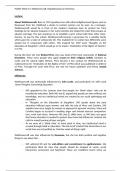Summary
Summary Wollstonecraft Theory Notes
- Institution
- The University Of Warwick (UoW)
Unlock the intellectual treasures of political theory with our meticulously crafted notes from Warwick's PAIS Department's module, "Political Theory from Hobbes (PO201)." Dive deep into the ideas of influential Western European thinkers since the 17th century, benefiting from extensive coverage, in...
[Show more]



